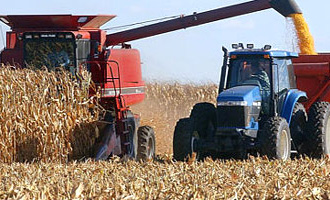 |
 |
 |
 Editorials | Issues | July 2007 Editorials | Issues | July 2007  
Should Canadian Farmers Cash in on Biofuel Boom?
 Nicole Tomlinson - CTV.ca Nicole Tomlinson - CTV.ca
go to original


| | Latin America is rushing to supply the U.S., which already imports over half the ethanol Brazil produces, because the U.S. government's biofuel targets exceed the country's agricultural capacity. |
When the ethanol market caused the price of corn tortillas to climb by 55 per cent last summer, tens of thousands of demonstrators protested in Mexico City.

A year later, Mexican farmers are burning their fields of blue agave, the main ingredient in tequila, to grow corn to feed North America's appetite for biofuels.

Canadians will likely have to pay more for tequila as less agave is planted. But before drowning your sorrows in a few shots of Cuervo Gold, cursing those who dare destroy its staple ingredient, you might want to reconsider where you're placing the blame.

Eric Holt-Giménez, who worked alongside farmers in Central America while completing his PhD, said their change of heart isn't all that hard to understand.

"If it makes money, farmers will grow it," the executive director of the Institute for Food and Development Policy said.

Corn is netting more than agave because the world is using ethanol as an alternative to fossil fuels - and Mexico isn't the only Latin American country cashing in.

Plantations growing other biofuel crops like sugarcane, oil palm, and soy have already popped up in several countries in South America - Holt-Giménez says the total land used for soybean cultivation in has increased by a factor of 57 since 1961.

For example, soybeans supply 40 per cent of Brazil's biodiesel - and NASA observers have linked an increase in their market price with the destruction of the Amazon rainforest.

Brazil is also the largest producer of sugarcane in the world - it makes 60 per cent of the globe's total sugar ethanol, and uses 13 per cent of its total herbicide load growing the crop.

"Brazil has a huge ethanol industry," Holt-Giménez said. "The environmental costs are tremendous, and the returns so paltry."

Holt-Giménez said Latin America is rushing to supply the U.S., which already imports over half the ethanol Brazil produces, because the U.S. government's biofuel targets exceed the country's agricultural capacity.

And studies show Canada is in the same boat as the U.S.

Research published by the federal government found Canada would have to use 36 per cent of its farmland to produce enough biofuels to replace just 10 per cent of the fuel currently used for transportation.

The publication also said 48 to 52 per cent of Canada's total corn-seeded area and 11 to 12 per cent of the wheat-seeded area would have to be used - all this for Canada to reach its domestic biofuel target of 5 per cent of the national fuel consumption by 2010.

Do the math

One hectare of sugarcane grown in Brazil produces almost twice as much ethanol as the same area of corn grown in Canada - so should we be the next country to look south for our biofuels?

Kory Teneycke, the executive director of the Canadian Renewable Fuels Association, says North American fuel demand keeps rising - and using some foreign biofuel may be a good way to help ease our energy shortage.

"Canada's traditional crude peaked in the 1980s ... we're short energies," Teneycke said.

"And in terms of whether we need to produce every litre of biofuel from a Canadian crop, or produce it all in Canada, I don't think we need to."

Teneycke says Latin American countries without oil reserves are getting an opportunity to tap into a market traditionally reserved for areas rich in fossil fuels.

"The beauty of biofuels is that you don't have to have won the geological petroleum lottery in order to produce them - this produces a massive equalizer," Teneycke said.

He explained farmers, like the ones in Mexico trading in their blue agave for more lucrative corn, will have a better quality of life because they'll be making more money.

But Holt-Giménez says aggressive farming for biofuel production in Latin America only benefits big agri-business that's taking over countries such as Brazil and dispersing local farmers - no matter what they're cultivating.

"It's not about local independence or the local economy ... It's good for grain companies, genetic engineering companies, and the automobile industry," Holt-Giménez said.

Studies have also shown ethanol produced in countries like Brazil actually contributes to climate change when the component crops are being grown on rainforest land.

A 2005 World Wildlife Fund study suggested that Brazil's biofuel program reduces transport emissions by 9 megatonnes a year - but 80 per cent of the country's greenhouse gas emissions came from deforestation.

It also found a hectare of land in Brazil grows enough sugarcane to make ethanol and save 13 tonnes of carbon dioxide a year. But if natural forests were allowed to regenerate on the same land, the trees would absorb 20 tonnes every year.

Even though biofuels aren't a magic solution to global energy, environmental or agricultural problems, be prepared to see more expensive tequila, and more ethanol-dedicated fields, as people try to cash in on the market for a seemingly impossible dream.

"We're trying to consume our way out of over-consumption," Holt-Giménez said.

"We can't possibly produce enough corn - but everybody's going to try." | 
 | |
 |



